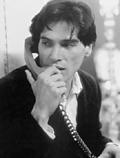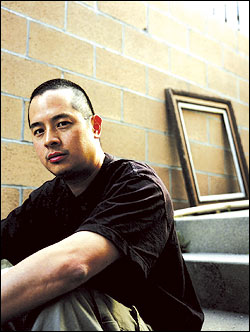From Thursday, April 14, through Sunday, April 17, Experience Music Project’s Pop Music Studies Conference, now in its fourth year, brings together a wide array of journalists, musicians, and scholars to discuss the greatest art form in the world (death threats can be addressed to the e-mail below). This year’s conference is especially bountiful, with over 100 speakers crammed into four days. You can find the complete lineup at www.emplive.com. Here are 10 sessions that look especially interesting:
Eric Lott et al., “Love and Theft Revisited” (Liquid Lounge, 7:15 p.m. Thursday). Lott’s highly regarded minstrelsy study, Love and Theft, provided Bob Dylan with the title of his 2001 album. It also gives a focus to this panel, moderated by EMP’s Eric Weisbard and featuring The New Yorker‘s Sasha Frere-Jones, Stagolee Shot Billy author Cecil Brown, Princeton’s Daphne Brooks, and Songs in the Key of Black Life author Mark Anthony Neal, among others.
Charles Kronengold, “How Not to Be Mistaken for a Pop Song” (Demo Lab, 10:45 a.m. Friday). Wayne State’s Kronengold is one of the most consistently inspired speakers at the conference; here, he proposes to tell us “what happens when you see a pop song sweat.”
Daphne Carr, “Dancing, Democracy and Kitsch: Poland’s Disco-Polo” (Demo Lab, 2 p.m. Friday). Frequent SW music contributor and Columbia University grad student Carr discusses the fascinating Polish-made disco and the way it ties expatriate Poles in Brooklyn to their homeland. Maddeningly, this will be happening opposite the “Tune Detectives” panel in the Learning Labs, where SW music columnist Douglas Wolk and I will be presenting histories of the songs “Things Go Better With Coke” and “Apache,” respectively.
Michelle Habell-Pallan, “? and the Mysterians: Early Punk’s Hidden Identity” (Learning Labs, 5:30 p.m. Friday). The University of Washington ethnic studies professor will point out the musical parallels between the Tex-Mex proto-punk band’s garage-rock classic “96 Tears” and the conjunto the band grew up with, as well as examine the band’s evasion of ethnic identity.
Cecil Brown, “Did She Do Us Wrong? Mae West as White Negress” (JBL Theater, 9 a.m. Saturday). The title alone is intriguing; Brown plans to talk about West’s rendition of the classic ballad “Frankie and Albert.”
Alexandra Richmond, “I Walked With a Juggalo: The Music, the Message, the Makeup” (Demo Lab, 9 a.m. Saturday). The Trentonian writer plans to, in fact, “walk with the Juggalos” (to where, 7-Eleven?) in order to enrich her study of the die-hard fans of the worst musical act in America today, Insane Clown Posse.
Panel, “How to Rock Like a Black Feminist Critic”(JBL Theater, 5:30 p.m. Saturday). Four papers delivered by just what the name indicates: Daphne Brooks on rockism, Kandia Crazy Horse on the “Unhappy Trails of the Redneck Negress,” Laina Dawes on “The Trials and Tribulations of a Black Female Metalhead,” and Sonnet Retman on funk and rock vocalist Nona Hendryx.
Keith Harris, “Popular Frontin'” (Demo Lab, 5:30 p.m. Saturday). Or, as the subtitle puts it, “How Roots-Rock Cornballs Make the Rest of Us Lefties Look Clueless by Impersonating Outdated Stereotypes of Imaginary Poor Country Folk,” by the SW contributor.
Griffin Woodworth, “Prince, Miles, and Maceo: Horns and the Performance of Black Masculinity” (JBL Theater, 9 a.m. Sunday). As the author of a book about Prince that discusses his use of horns, I’m especially intrigued by this one.
Kelsey Cowger, “Reading ‘Bamp-chicka-waa-waa’: Funk, Porn, and the Vision of John Shaft” (Learning Labs, 10:45 a.m. Sunday). By “vision,” we can guess that UCLA’s Cowger isn’t referring to brown leather on orange turtleneck.







